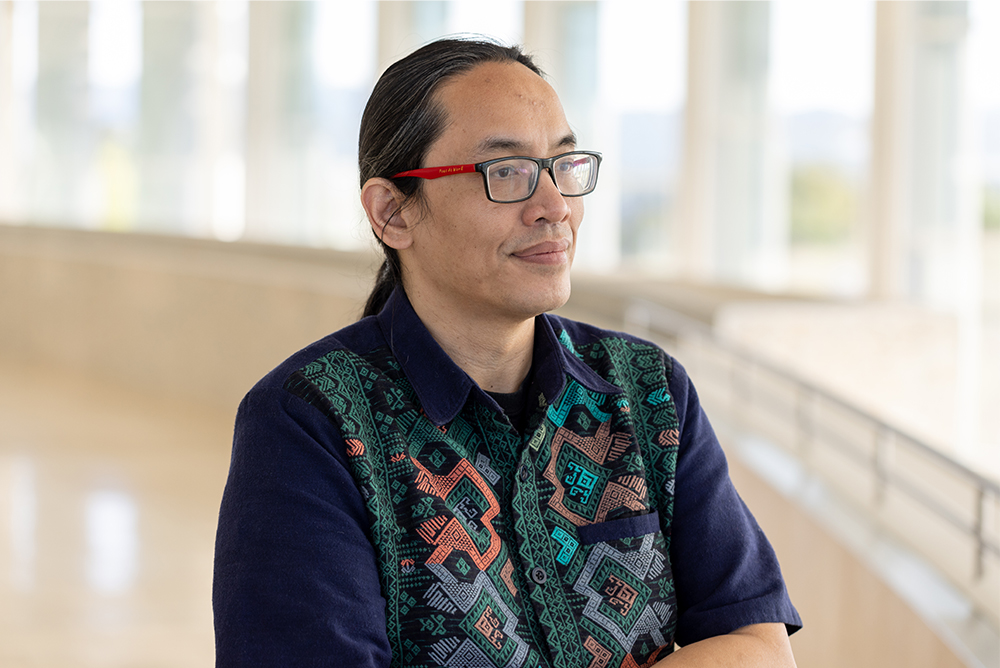
Courtesy of Luis Luque.
Bryan Thao Worra is a Laotian American poet and writer. He served as a Cultural Olympian for Laos during the 2012 London Summer Games and is the president of the Science Fiction and Fantasy Poetry Association. Before speaking at a Zócalo/Soraya event, “How Do Homelands Cross Borders?” he spoke to us in the green room about Godzilla, Laotian history, and his favorite proverb.
As a kid, what did you want to be when you grew up?
I think I wanted to be so many things all at once. I’m happy to say it narrowed down real fast to I was going to be a writer. I don’t know what got that into my mind. But the opportunities kept presenting themselves.
What is one of your favorite science fiction works?
I liked Star Wars and Star Trek growing up. But it was being able to see Asian culture within Godzilla at the time. As a Southeast Asian refugee, to suddenly see television shows and media where you can be both a hero and a villain—rather than just a target—was very different. I’m also always partial to the film Blade Runner, which turns 40 this year. In it, there was this world that had such a strong Asian influence. And there is a throwaway scene in which a detective is after a piece of evidence and goes to a Cambodian street geneticist. It makes me laugh: the fact that in that world of 2019, a Cambodian woman who likely survived the Killing Fields could actually have gotten the degrees and skills to be a genetic engineer on the street, free of corporate oversight: I thought wow.
What’s one place you like to go in Minneapolis?
These days I like to go to the Loft Literary Center in the Open Book building, where I got my start as a writer and creator. It’s a public space where you could just drop in, you don’t have to buy anything. For writers, especially coming from communities of color, that’s such an important resource. You might run into a famous writer, or a not-famous writer. That is what good art is always about: not just the people you plan to meet with purpose, but what you can stumble upon.
What is something about Lao history you think Americans should know?
The biggest challenge to understanding Lao history is to understand how closely tied it is to American history, beginning with the end of the French colonization in 1954. Pretty soon the U.S. got involved in the secret war with a proxy army and conducted a bombing campaign that left over 30% of Laos contaminated with cluster bombs over half a century later. People can have a lot of different positions on that, but I think it does teach us that we have to be careful about how we get involved in those conflicts and what we accept.
Your recent book is called Before We Remember We Dream. Can you describe a dream you remember?
Before I had discovered them, I dreamt of my long-lost family. I wouldn’t find them until I was 30 years old. I had to go all the way back to Laos to find out they were living in Modesto [in California]! It was just interesting that I thought I had had a conversation with my mom and I could visualize her from photos and paperwork, this person who was so fundamental to my life.
Have you ever crossed a border or line that you shouldn’t have?
There is one relationship where I really went over the top, where I was willing to go past all my usual standards and rules for myself. I did not end up with her in the end, but what’s interesting is that a good relationship makes you reassess. It was a good violation of those rules then.
Is there an idiom or proverb that stays with you?
There is a Lao proverb that breaks down to: If you don’t polish your jewels, in three years they become rocks; if you don’t visit your friends, in three years they become strangers. We can’t take our time with one another for granted, whether that’s your mentors, teachers, friends.
What is some advice you would offer young poets?
I think the one that resonates the most these days with young poets is simply that you don’t have to worry so much about trying to sound like other poets or writers. Ultimately, the poet we’re looking for is you. Be comfortable with the premise of failure, of risk. Perfection is a trap. You’re just looking for the best word that serves you now.



